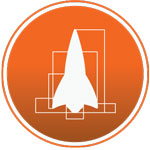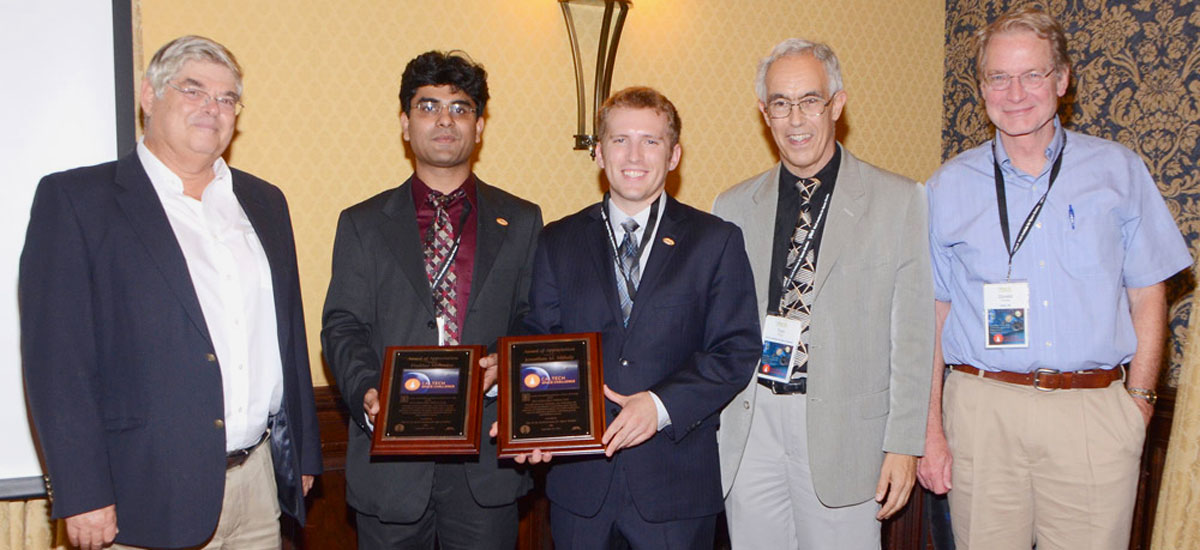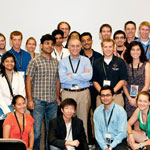Jonathan Mihaly
KISS Challenges Students to Achieve New Heights
Caltech alumnus Jonathan Mihaly (PhD ’13, Aerospace) builds instruments to explore other moons and planets. Currently the Lead Mechanical Engineer for the Europa Radar Instrument at JPL, Mihaly is one of a new cadre of leaders already impacting the space program.

Jonathan Mihaly was the founder and the Student Lead of the first Caltech Space Challenge in 2011. At that time, Jonathan was a Ph.D. Candidate in Aeronautics at the Graduate Aerospace Laboratories at the California Institute of Technology (GALCIT). His research was focused on the development and implementation of high-speed optical diagnostics to characterize hypervelocity impact damage mechanics and phenomena. Jon received his BS in Aerospace Engineering from Syracuse University in 2007 as a graduate of the Honors Program. Jon received his MS in Aeronautics from Caltech in 2008. Upon completing his Ph.D., Jon continued to pursue a career in the human spaceflight industry.
“Caltech does a really good job of teaching you how to be a technical expert at something,” Mihaly said. “But there’s a lot more to it than that. You have to learn how to work with a team and how to bring people together to tackle multi-disciplinary problems. As a student at Caltech my most meaningful experiences outside the classroom and lab were because of KISS (Keck Institute for Space Studies). That’s where I learned how to bring people together and harness their energy and excitement towards solving a difficult problem.”
“
As a student at Caltech my most meaningful experiences outside the classroom and lab were because of KISS (Keck Institute for Space Studies).
”
Mihaly and fellow Caltech alumnus Prakhar Mehrotra approached KISS with a student-led proposal to organize the first Caltech Space Challenge in 2011. Their goal: answer President Obama’s call to send astronauts to an asteroid by 2025. “KISS gave us incredible support and the seed money which we were then able to quintuple through a variety of generous donors.” The bottom line: “We were able to put together a weeklong international student mission design competition. We had hundreds of students apply from over one hundred universities from over 25 countries worldwide. The competition brought together very excited, extremely talented students from all over the world. They were mentored by experts from JPL and industry and provided with a week-long lecture series by such experts.” According to the jury of industry leaders and experts, the students produced first-rate mission designs. This successful KISS model has now been repeated multiple times by new groups of students at Caltech.


The Caltech Space Challenge is a 5-day student space mission design competition. Students from a wide range of backgrounds (in both discipline and nationality) are invited to Caltech, formed into two teams, and given a mission design problem. The student teams attend lectures related to mission planning, are given the necessary development tools, and are challenged to produce a viable mission design. This confluence of people and resources is a unique opportunity for young and enthusiastic students to work with experienced professionals in academia, industry and national laboratories. The first Caltech Space Challenge took place in 2011. At that time, participants were asked to develop a comprehensive 90-180 day manned mission to a Near-Earth Object (NEO) featuring a stay-time on NEO of about 7-14 days and sample return. The challenge concluded with final presentations at Caltech, the submission of a final report, constructive feedback for both teams, and the announcement of the winning team. The report provided a complete description of the mission design, key technologies needed and their readiness level (TRL), the operating costs, timeline, etc. Students benefited tremendously by working in a multidisciplinary teams, learning about project management and systems engineering, and connecting with top scientists and engineers in industry.
A Ladder to Success
KISS has a wide network of space connections and is known as the go-to place for young talent. While still a grad student in August 2012, Mihaly got a surprise voice mail from an unknown number. “It was actually astronaut Buzz Aldrin, looking for an intern. Because of my involvement with KISS, I had the opportunity to work with and still get to work with Buzz.”
“
“KISS is that extra ladder that you can put on the foundation to help you reach those high, challenging goals. Without that ladder my education would be incomplete.”
”
Jonathan Mihaly
“KISS has been instrumental to my education in terms of how to tackle a challenging problem. The classroom and the lab work are fundamental and serve as your foundation to stand on. But KISS is that extra ladder that you can put on that foundation to help you reach those high, challenging goals. So from my experience, without that ladder my education would be incomplete.”